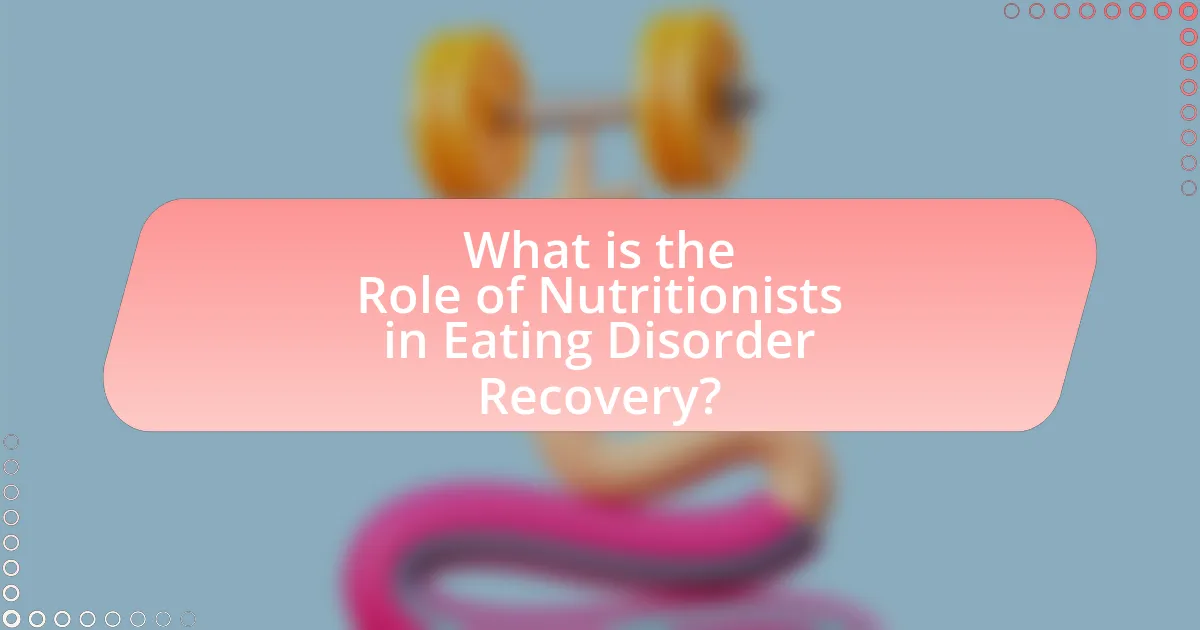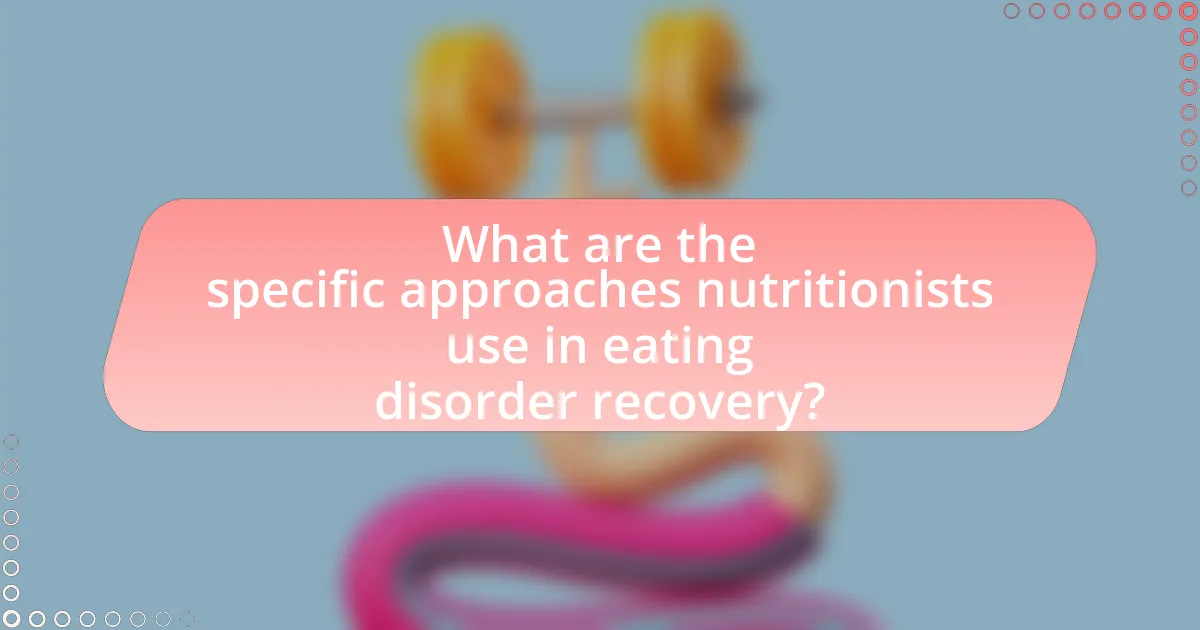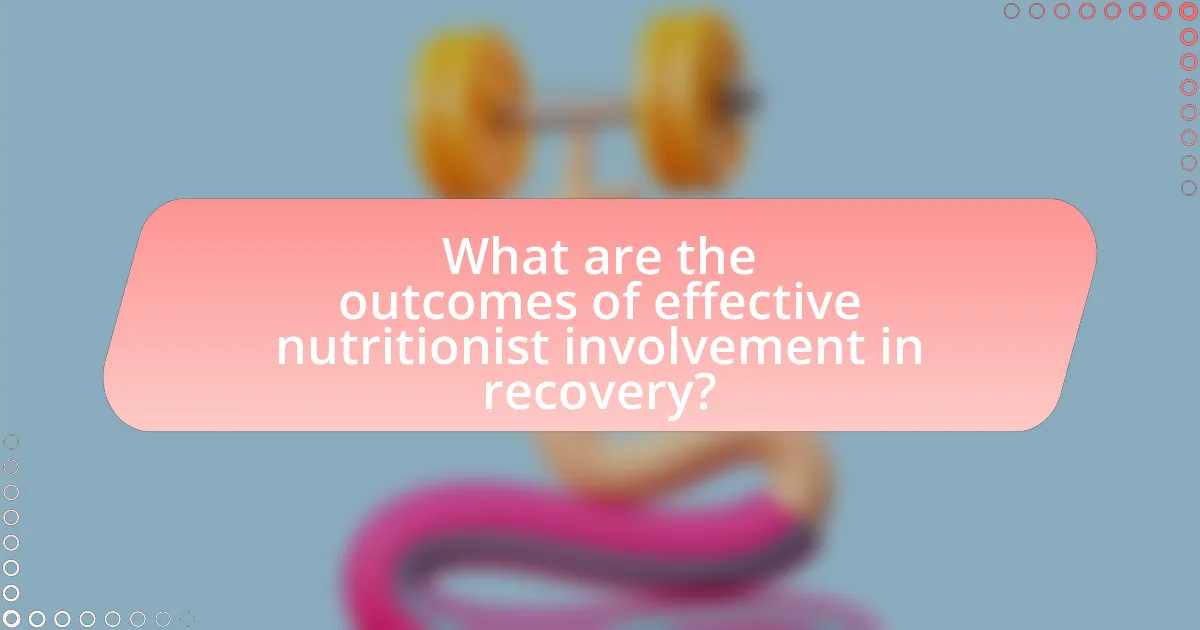Nutritionists play a vital role in the recovery process for individuals with eating disorders by providing personalized dietary guidance, meal planning, and nutritional education. They assess individual nutritional needs and develop tailored strategies that promote healthy eating habits while addressing psychological aspects of food relationships. Research indicates that structured nutritional interventions significantly improve recovery outcomes, including enhanced psychological well-being and better eating behaviors. This article explores the specific strategies nutritionists employ, their qualifications, the challenges they face, and the importance of collaboration with other healthcare professionals in supporting individuals on their recovery journey.

What is the Role of Nutritionists in Eating Disorder Recovery?
Nutritionists play a crucial role in eating disorder recovery by providing personalized dietary guidance and support. They assess the nutritional needs of individuals, develop meal plans that promote healthy eating habits, and help restore a balanced relationship with food. Research indicates that nutritionists can significantly improve recovery outcomes by addressing nutritional deficiencies and educating patients about proper nutrition, which is essential for physical and psychological healing. For instance, a study published in the Journal of Eating Disorders found that patients who received nutritional counseling alongside therapy showed greater improvements in their eating behaviors and overall health compared to those who did not receive such support.
How do nutritionists contribute to the recovery process?
Nutritionists contribute to the recovery process by providing tailored dietary plans that address the specific nutritional needs of individuals recovering from eating disorders. These professionals assess the individual’s health status, dietary preferences, and recovery goals to create a balanced meal plan that promotes physical healing and psychological well-being. Research indicates that structured nutritional guidance can significantly improve recovery outcomes, as evidenced by a study published in the Journal of Eating Disorders, which found that patients receiving nutritional counseling showed greater improvements in eating behaviors and psychological health compared to those who did not.
What specific strategies do nutritionists use in treatment?
Nutritionists use personalized meal planning, nutritional education, and behavioral modification strategies in treatment. Personalized meal planning involves creating tailored dietary plans that meet the specific needs and preferences of individuals, ensuring they receive adequate nutrition while addressing their eating disorder. Nutritional education helps clients understand the importance of balanced diets and the impact of food choices on their health, fostering a positive relationship with food. Behavioral modification strategies focus on changing unhealthy eating patterns and promoting mindful eating practices, which can significantly aid in recovery. These strategies are supported by research indicating that structured nutritional interventions improve outcomes for individuals with eating disorders, as highlighted in studies published in journals such as the “International Journal of Eating Disorders.”
How do nutritionists assess the nutritional needs of individuals?
Nutritionists assess the nutritional needs of individuals through a combination of dietary assessments, health history evaluations, and personalized goal setting. They typically conduct detailed interviews to gather information about an individual’s eating habits, lifestyle, and medical history, which helps identify specific nutritional deficiencies or excesses. Additionally, nutritionists may utilize tools such as food diaries, anthropometric measurements, and biochemical tests to gain a comprehensive understanding of an individual’s nutritional status. This multifaceted approach ensures that the nutritional recommendations are tailored to meet the unique needs of each person, particularly in the context of eating disorder recovery, where individualized care is crucial for effective treatment.
Why is the involvement of nutritionists crucial in eating disorder recovery?
The involvement of nutritionists is crucial in eating disorder recovery because they provide specialized dietary guidance that addresses both the physical and psychological aspects of these disorders. Nutritionists help individuals restore healthy eating patterns, educate them about balanced nutrition, and support the development of a positive relationship with food. Research indicates that comprehensive treatment for eating disorders, which includes nutritional counseling, significantly improves recovery outcomes, as evidenced by a study published in the Journal of Eating Disorders, which found that patients receiving nutritional support had higher rates of recovery compared to those who did not.
What are the psychological benefits of working with a nutritionist?
Working with a nutritionist provides significant psychological benefits, including enhanced self-esteem, improved body image, and reduced anxiety related to food choices. Nutritionists offer personalized guidance, which helps individuals feel more in control of their eating habits, leading to increased confidence in making healthier decisions. Research indicates that structured nutritional counseling can decrease feelings of guilt and shame associated with eating, fostering a more positive relationship with food. Additionally, the supportive environment created by nutritionists can alleviate stress and promote emotional well-being, contributing to overall mental health improvements during the recovery process from eating disorders.
How do nutritionists help in restoring healthy eating patterns?
Nutritionists help restore healthy eating patterns by providing personalized dietary guidance and education tailored to individual needs. They assess clients’ nutritional status, identify unhealthy eating behaviors, and develop structured meal plans that promote balanced nutrition. Research indicates that structured interventions by nutritionists can lead to improved dietary habits and better health outcomes, as evidenced by a study published in the Journal of the Academy of Nutrition and Dietetics, which found that clients who worked with nutritionists showed significant improvements in their eating patterns over a 12-week period.
What qualifications and skills should nutritionists have for this role?
Nutritionists should possess a bachelor’s degree in nutrition, dietetics, or a related field, along with relevant certifications such as Registered Dietitian Nutritionist (RDN) status. These qualifications ensure that nutritionists have a solid foundation in nutritional science and clinical practice. Additionally, essential skills include strong communication abilities to effectively educate clients, empathy to understand their challenges, and analytical skills to assess dietary needs and develop personalized meal plans. Research indicates that nutritionists with these qualifications and skills are more effective in supporting individuals with eating disorders, as they can provide evidence-based interventions tailored to each client’s unique situation.
What educational background is necessary for nutritionists in this field?
Nutritionists in the field of eating disorder recovery typically require a bachelor’s degree in nutrition, dietetics, or a related field. This foundational education provides essential knowledge about human nutrition, food science, and dietary planning. Many nutritionists also pursue a master’s degree or specialized training in eating disorders to enhance their expertise. Additionally, obtaining a registered dietitian (RD) credential, which involves completing an accredited internship and passing a national examination, is often necessary for professional practice in this area. This educational pathway ensures that nutritionists are equipped with the skills and knowledge to effectively support individuals recovering from eating disorders.
How do communication skills impact a nutritionist’s effectiveness?
Communication skills significantly enhance a nutritionist’s effectiveness by facilitating clear and empathetic interactions with clients. Effective communication allows nutritionists to accurately assess clients’ needs, convey complex nutritional information in an understandable manner, and build trust, which is crucial in the sensitive context of eating disorder recovery. Research indicates that strong communication skills correlate with improved client adherence to dietary recommendations and overall satisfaction with care, as evidenced by a study published in the Journal of Nutrition Education and Behavior, which found that clients who perceived their nutritionists as good communicators were more likely to follow prescribed dietary plans.
How do nutritionists collaborate with other healthcare professionals?
Nutritionists collaborate with other healthcare professionals by forming interdisciplinary teams to provide comprehensive care for patients, particularly in the context of eating disorder recovery. This collaboration often includes working alongside psychologists, psychiatrists, and medical doctors to create integrated treatment plans that address both the psychological and nutritional aspects of recovery. For instance, nutritionists may share insights on dietary needs and meal planning, while mental health professionals focus on behavioral therapy, ensuring that all aspects of a patient’s health are considered. Research indicates that such collaborative approaches can lead to improved patient outcomes, as evidenced by a study published in the Journal of Eating Disorders, which found that multidisciplinary treatment significantly enhances recovery rates in individuals with eating disorders.
What challenges do nutritionists face in eating disorder recovery?
Nutritionists face several challenges in eating disorder recovery, primarily due to the complex psychological and emotional factors involved. These professionals must navigate clients’ resistance to treatment, which can stem from deep-seated fears about weight gain and food intake. Additionally, nutritionists often encounter difficulties in establishing trust and rapport, as clients may have a history of negative experiences with food and body image.
Furthermore, the lack of standardized protocols for addressing diverse eating disorders complicates their approach, making it essential for nutritionists to tailor interventions to individual needs. Research indicates that approximately 30% of individuals with eating disorders also struggle with co-occurring mental health issues, such as anxiety and depression, which further complicates recovery efforts. This multifaceted nature of eating disorders requires nutritionists to collaborate closely with other healthcare providers, adding another layer of complexity to their role in recovery.

What are the specific approaches nutritionists use in eating disorder recovery?
Nutritionists use several specific approaches in eating disorder recovery, including individualized meal planning, nutritional education, and behavioral therapy integration. Individualized meal planning involves creating tailored dietary strategies that meet the unique needs of each patient, ensuring they receive adequate nutrition while addressing their specific eating behaviors. Nutritional education helps patients understand the importance of balanced diets and the role of various nutrients, which can empower them to make healthier choices. Additionally, integrating behavioral therapy techniques, such as cognitive-behavioral strategies, allows nutritionists to address the psychological aspects of eating disorders, facilitating a more holistic recovery process. These approaches are supported by research indicating that comprehensive nutritional interventions significantly improve recovery outcomes in individuals with eating disorders.
How do nutritionists create personalized meal plans?
Nutritionists create personalized meal plans by assessing individual dietary needs, preferences, and health conditions. They begin with a comprehensive evaluation that includes medical history, lifestyle factors, and specific nutritional requirements. This assessment allows nutritionists to tailor meal plans that not only meet caloric and macronutrient needs but also consider food preferences and any allergies or intolerances. Research indicates that personalized nutrition can significantly improve adherence to dietary recommendations and overall health outcomes, as seen in studies published in journals like the American Journal of Clinical Nutrition.
What factors do nutritionists consider when designing meal plans?
Nutritionists consider individual dietary needs, health conditions, lifestyle factors, and personal preferences when designing meal plans. Individual dietary needs include macronutrient and micronutrient requirements based on age, gender, and activity level. Health conditions such as diabetes, allergies, or gastrointestinal issues influence food choices and portion sizes. Lifestyle factors, including work schedules and physical activity levels, affect meal timing and frequency. Personal preferences, including cultural influences and food aversions, ensure that the meal plan is enjoyable and sustainable. These considerations are essential for creating effective meal plans that support recovery from eating disorders and promote overall health.
How do meal plans evolve throughout the recovery process?
Meal plans evolve throughout the recovery process by gradually increasing in complexity and variety to meet the changing nutritional needs of individuals. Initially, meal plans may focus on stabilizing weight and ensuring adequate caloric intake, often consisting of structured meals that emphasize essential nutrients. As recovery progresses, nutritionists typically introduce more diverse food options, allowing for greater flexibility and personal preferences, which supports the development of a healthier relationship with food. This evolution is supported by research indicating that personalized meal plans can enhance adherence to nutritional guidelines and improve psychological outcomes in individuals recovering from eating disorders.
What role does education play in a nutritionist’s approach?
Education is fundamental in a nutritionist’s approach as it equips them with the knowledge and skills necessary to assess dietary needs, develop personalized nutrition plans, and provide evidence-based guidance. A well-educated nutritionist understands the complexities of human nutrition, including the psychological and physiological aspects of eating disorders, which is crucial for effective intervention. Research indicates that nutritionists with advanced education, such as a master’s degree or specialized training in eating disorders, are more adept at addressing the unique challenges faced by individuals in recovery, leading to improved outcomes. For instance, a study published in the Journal of the Academy of Nutrition and Dietetics highlights that nutritionists with formal education in behavioral health are better prepared to support clients with eating disorders, demonstrating the critical role of education in their practice.
How do nutritionists educate clients about nutrition and health?
Nutritionists educate clients about nutrition and health through personalized assessments, evidence-based guidance, and ongoing support. They begin by evaluating clients’ dietary habits, health status, and specific needs, which allows them to create tailored nutrition plans. Nutritionists utilize scientific research to inform their recommendations, ensuring that clients receive accurate and relevant information about food choices, nutrient intake, and overall wellness. Additionally, they provide practical strategies for meal planning, cooking, and understanding food labels, which empowers clients to make informed decisions. Regular follow-ups and adjustments to the nutrition plan help maintain accountability and encourage sustainable lifestyle changes.
What resources do nutritionists provide to support learning?
Nutritionists provide educational materials, personalized meal plans, and workshops to support learning in the context of eating disorder recovery. These resources are designed to enhance understanding of nutrition, promote healthy eating habits, and facilitate behavioral changes. For instance, nutritionists often utilize evidence-based guidelines and research to create tailored meal plans that address individual needs, which can significantly improve recovery outcomes. Additionally, workshops led by nutritionists can offer practical skills and knowledge, empowering individuals to make informed dietary choices.
How do nutritionists address emotional and psychological aspects of eating?
Nutritionists address emotional and psychological aspects of eating by employing a holistic approach that integrates behavioral therapy techniques with nutritional guidance. They recognize that eating behaviors are often influenced by emotions, stress, and psychological conditions, and therefore, they assess clients’ emotional relationships with food. Nutritionists may utilize strategies such as mindful eating practices, cognitive-behavioral techniques, and motivational interviewing to help clients understand their triggers and develop healthier coping mechanisms. Research indicates that integrating psychological support with nutritional counseling can significantly improve outcomes in eating disorder recovery, as evidenced by a study published in the Journal of Eating Disorders, which found that patients receiving combined treatment showed greater improvements in both psychological well-being and eating behaviors compared to those receiving standard nutritional advice alone.
What techniques do nutritionists use to promote a positive relationship with food?
Nutritionists use techniques such as mindful eating, intuitive eating, and education on nutrition to promote a positive relationship with food. Mindful eating encourages individuals to focus on the sensory experience of eating, helping them to recognize hunger and fullness cues, which can reduce emotional eating. Intuitive eating teaches clients to trust their body’s signals and make food choices based on their needs rather than external rules, fostering a healthier mindset towards food. Additionally, nutrition education provides individuals with knowledge about food groups, nutrients, and balanced meals, empowering them to make informed choices without guilt. These techniques are supported by research indicating that mindful and intuitive eating can lead to improved psychological well-being and reduced disordered eating behaviors.
How do nutritionists help clients cope with triggers and cravings?
Nutritionists help clients cope with triggers and cravings by providing personalized dietary plans and strategies to manage emotional eating. They assess individual triggers, such as stress or specific food cues, and educate clients on recognizing these patterns. Nutritionists also teach coping mechanisms, such as mindfulness techniques and healthy alternatives to cravings, which can reduce the likelihood of relapse into unhealthy eating behaviors. Research indicates that structured nutritional guidance can significantly improve emotional regulation and reduce binge eating episodes, highlighting the effectiveness of nutritionists in supporting clients through their recovery journey.

What are the outcomes of effective nutritionist involvement in recovery?
Effective nutritionist involvement in recovery leads to improved nutritional status, enhanced psychological well-being, and better overall health outcomes for individuals with eating disorders. Research indicates that personalized nutrition plans developed by nutritionists can significantly aid in restoring healthy eating patterns and addressing nutritional deficiencies. For instance, a study published in the Journal of Eating Disorders found that patients receiving structured nutritional counseling showed a higher rate of weight restoration and reduced symptoms of anxiety and depression compared to those who did not receive such support. This demonstrates that the expertise of nutritionists is crucial in facilitating both physical recovery and emotional resilience in individuals undergoing treatment for eating disorders.
How can progress be measured in eating disorder recovery?
Progress in eating disorder recovery can be measured through a combination of clinical assessments, self-reported outcomes, and behavioral changes. Clinical assessments often include monitoring weight, nutritional intake, and physical health indicators, which provide objective data on the individual’s health status. Self-reported outcomes, such as changes in attitudes towards food and body image, can be evaluated using standardized questionnaires like the Eating Disorder Inventory. Behavioral changes, including the ability to engage in regular meals and reduced frequency of disordered eating behaviors, also serve as indicators of progress. Research indicates that a multi-faceted approach, incorporating these various measures, leads to a more comprehensive understanding of recovery, as evidenced by studies showing that improvements in psychological well-being correlate with better nutritional habits and overall health outcomes.
What indicators show improvement in nutritional health?
Indicators that show improvement in nutritional health include increased body mass index (BMI), improved dietary diversity, and enhanced biochemical markers such as blood nutrient levels. A rise in BMI indicates a healthier weight status, while dietary diversity reflects a broader intake of essential nutrients. Additionally, improved biochemical markers, such as elevated levels of vitamins and minerals in the blood, signify better nutritional status. Studies have shown that these indicators correlate with overall health improvements and recovery from eating disorders, highlighting the effectiveness of nutritional interventions in promoting health.
How do clients’ self-reported experiences reflect recovery success?
Clients’ self-reported experiences reflect recovery success by providing direct insights into their emotional and psychological well-being during the recovery process. These self-reports often include improvements in mood, self-esteem, and coping strategies, which are critical indicators of progress. Research indicates that clients who articulate positive changes in their relationship with food and body image are more likely to achieve long-term recovery. For instance, a study published in the Journal of Eating Disorders found that individuals who reported increased satisfaction with their eating habits and reduced anxiety around food demonstrated higher recovery rates. This correlation underscores the importance of self-reported experiences as a valid measure of recovery success in the context of eating disorder treatment.
What are common misconceptions about nutritionists in this field?
Common misconceptions about nutritionists in the field of eating disorder recovery include the belief that they only focus on weight loss and calorie counting. In reality, nutritionists are trained to provide holistic support that addresses the psychological, emotional, and physical aspects of eating disorders. They emphasize the importance of developing a healthy relationship with food rather than merely focusing on weight. Additionally, some people think that nutritionists can prescribe medications or diagnose eating disorders, which is inaccurate; only licensed healthcare professionals, such as doctors or psychologists, can perform those functions. These misconceptions can hinder the effectiveness of treatment and the understanding of the nutritionist’s role in recovery.
How do these misconceptions affect client perceptions?
Misconceptions about nutritionists can significantly distort client perceptions, leading to distrust and reluctance to engage in treatment. For instance, if clients believe that nutritionists solely focus on weight loss, they may perceive them as unsupportive of their recovery journey, which can hinder their willingness to seek help. Research indicates that clients who hold negative stereotypes about nutritionists are less likely to adhere to treatment plans, as they may feel judged or misunderstood. This disconnect can ultimately impede the effectiveness of recovery strategies, as clients may avoid open communication about their struggles, further complicating their path to healing.
What can be done to clarify the role of nutritionists?
To clarify the role of nutritionists, establishing clear professional guidelines and standards of practice is essential. These guidelines should define the specific responsibilities of nutritionists in the context of eating disorder recovery, including their role in developing individualized meal plans, providing nutritional education, and collaborating with other healthcare professionals. Research indicates that structured interventions led by nutritionists can significantly improve recovery outcomes for individuals with eating disorders, as evidenced by a study published in the Journal of Eating Disorders, which found that comprehensive nutritional support is crucial for effective treatment.
What practical tips can enhance the effectiveness of nutritionists in recovery?
Nutritionists can enhance their effectiveness in recovery by employing personalized meal planning, fostering open communication, and integrating behavioral strategies. Personalized meal planning allows nutritionists to tailor dietary recommendations to individual needs, which has been shown to improve adherence and outcomes in recovery settings. Open communication builds trust and encourages clients to share their challenges, facilitating a more supportive environment. Additionally, integrating behavioral strategies, such as mindfulness and cognitive-behavioral techniques, can help clients develop a healthier relationship with food, as supported by research indicating that these approaches can significantly reduce relapse rates in eating disorder recovery.


